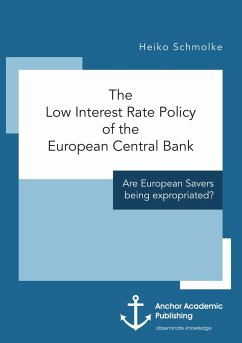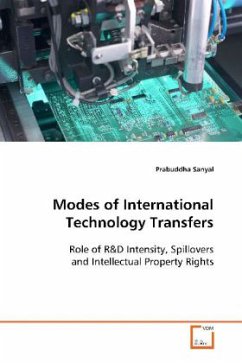
Expropriation Risk and Technology
Foreign Direct Investment in Emerging Market Countries
Versandkostenfrei!
Versandfertig in 6-10 Tagen
32,99 €
inkl. MwSt.

PAYBACK Punkte
16 °P sammeln!
My paper characterizes a dynamic relation between afirm and an impatientgovernment that may expropriate the firm withoutlegal punishment. The onlysanction mechanism of the firm results from itsproductivity advantage inmanaging its assets. In this environment, I derivedynamics of investment andtransfers and characterize the unique stationaryallocation. The steady state features non-monotoniccomparativestatics of the government''s payoff with respect toits relative productionefficiency. While the reduced incentive problemassociated with technologicalincompetence increases investment efficiency, ...
My paper characterizes a dynamic relation between a
firm and an impatient
government that may expropriate the firm without
legal punishment. The only
sanction mechanism of the firm results from its
productivity advantage in
managing its assets. In this environment, I derive
dynamics of investment and
transfers and characterize the unique stationary
allocation. The steady state features non-monotonic
comparative
statics of the government''s payoff with respect to
its relative production
efficiency. While the reduced incentive problem
associated with technological
incompetence increases investment efficiency, the
lower threat point limits
the share of the surplus obtained by the government.
Markov-type discount rate
shocks of the government generate expropriation on
the equilibrium path with
low technology-intensive sectors at the top of the
pecking order. Firms are
able to mitigate the government''s incentive to
expropriate via non-horizontal
integration. The model predictions are consistent
with observed contracts
between sovereign countries and foreign direct
investors.
firm and an impatient
government that may expropriate the firm without
legal punishment. The only
sanction mechanism of the firm results from its
productivity advantage in
managing its assets. In this environment, I derive
dynamics of investment and
transfers and characterize the unique stationary
allocation. The steady state features non-monotonic
comparative
statics of the government''s payoff with respect to
its relative production
efficiency. While the reduced incentive problem
associated with technological
incompetence increases investment efficiency, the
lower threat point limits
the share of the surplus obtained by the government.
Markov-type discount rate
shocks of the government generate expropriation on
the equilibrium path with
low technology-intensive sectors at the top of the
pecking order. Firms are
able to mitigate the government''s incentive to
expropriate via non-horizontal
integration. The model predictions are consistent
with observed contracts
between sovereign countries and foreign direct
investors.












